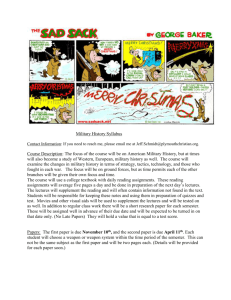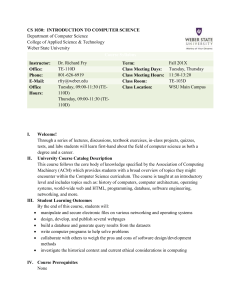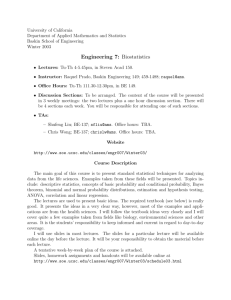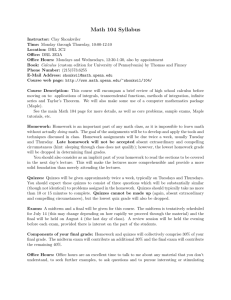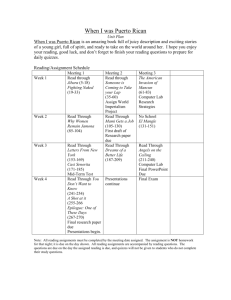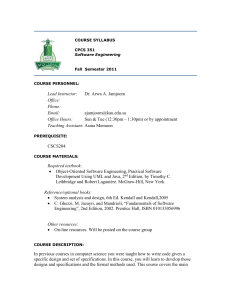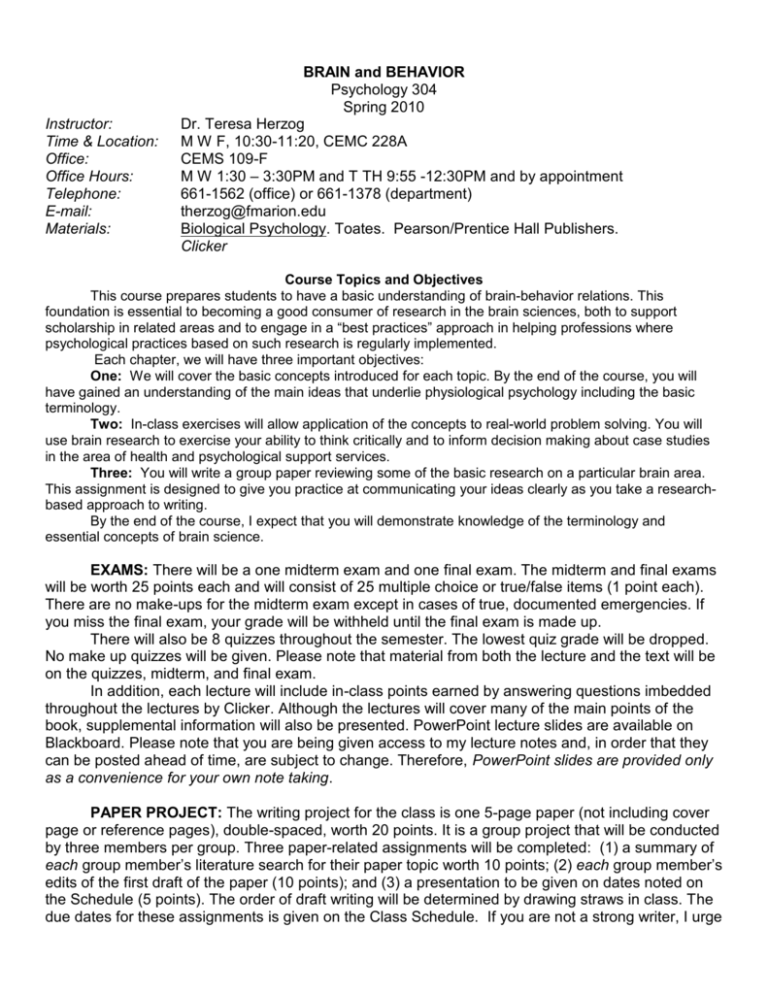
Instructor:
Time & Location:
Office:
Office Hours:
Telephone:
E-mail:
Materials:
BRAIN and BEHAVIOR
Psychology 304
Spring 2010
Dr. Teresa Herzog
M W F, 10:30-11:20, CEMC 228A
CEMS 109-F
M W 1:30 – 3:30PM and T TH 9:55 -12:30PM and by appointment
661-1562 (office) or 661-1378 (department)
therzog@fmarion.edu
Biological Psychology. Toates. Pearson/Prentice Hall Publishers.
Clicker
Course Topics and Objectives
This course prepares students to have a basic understanding of brain-behavior relations. This
foundation is essential to becoming a good consumer of research in the brain sciences, both to support
scholarship in related areas and to engage in a “best practices” approach in helping professions where
psychological practices based on such research is regularly implemented.
Each chapter, we will have three important objectives:
One: We will cover the basic concepts introduced for each topic. By the end of the course, you will
have gained an understanding of the main ideas that underlie physiological psychology including the basic
terminology.
Two: In-class exercises will allow application of the concepts to real-world problem solving. You will
use brain research to exercise your ability to think critically and to inform decision making about case studies
in the area of health and psychological support services.
Three: You will write a group paper reviewing some of the basic research on a particular brain area.
This assignment is designed to give you practice at communicating your ideas clearly as you take a researchbased approach to writing.
By the end of the course, I expect that you will demonstrate knowledge of the terminology and
essential concepts of brain science.
EXAMS: There will be a one midterm exam and one final exam. The midterm and final exams
will be worth 25 points each and will consist of 25 multiple choice or true/false items (1 point each).
There are no make-ups for the midterm exam except in cases of true, documented emergencies. If
you miss the final exam, your grade will be withheld until the final exam is made up.
There will also be 8 quizzes throughout the semester. The lowest quiz grade will be dropped.
No make up quizzes will be given. Please note that material from both the lecture and the text will be
on the quizzes, midterm, and final exam.
In addition, each lecture will include in-class points earned by answering questions imbedded
throughout the lectures by Clicker. Although the lectures will cover many of the main points of the
book, supplemental information will also be presented. PowerPoint lecture slides are available on
Blackboard. Please note that you are being given access to my lecture notes and, in order that they
can be posted ahead of time, are subject to change. Therefore, PowerPoint slides are provided only
as a convenience for your own note taking.
PAPER PROJECT: The writing project for the class is one 5-page paper (not including cover
page or reference pages), double-spaced, worth 20 points. It is a group project that will be conducted
by three members per group. Three paper-related assignments will be completed: (1) a summary of
each group member’s literature search for their paper topic worth 10 points; (2) each group member’s
edits of the first draft of the paper (10 points); and (3) a presentation to be given on dates noted on
the Schedule (5 points). The order of draft writing will be determined by drawing straws in class. The
due dates for these assignments is given on the Class Schedule. If you are not a strong writer, I urge
PSY 304, Spring 2010, p. 2
you to take your draft to the Writing Center. Assignments must be turned in on the announced due
dates to avoid a penalty of 1 point-a-day for late assignments. In addition, the draft is subject to point
deductions by failure of the editor to miss obvious problems as stipulated by the criteria sheet. The
final style for the paper must be APA style. Every departure from APA style will result in a deduction
of one point. It is advisable that all students familiarize themselves with this style via the Publication
Manual of the American Psychological Association (5th Edition).
CLASS ASSIGNMENTS: Credit will be given for in-class case studies, each worth 2 points.
These will be group projects for which no grade will be given. No make-up for the case studies will be
available. Please note that although target dates for the case studies appear on the Schedule, these
are subject to change given availability of audiovisual materials that form the case examples.
ATTENDANCE: Because of the demand for places in the class and excess enrollment,
attendance will be monitored. Any student missing more than 4 classes will be automatically
dropped, without discussion, on the day of the 5 th absence. Please note that assignments and
quizzes will be returned at the beginning of the class following. If you are not in class that day or are
late, you can collect any materials in my office.
READING ASSIGNMENTS: You will notice that sometimes the assigned pages do not end with the
conclusion of a major section. In this case, the assignment is to read through the last subsection that begins
on that page. Of course, you are encouraged to read unassigned pages! However, you are not responsible for
this “extra” material.
CLICKER POINTS: Questions imbedded within the lectures are designed to test students in
three areas: (1) rehearsal of the current day’s material, to encourage active listening and participation
in the lecture, (2) recall of material from previous lectures, especially material which is re-introduced
into the current topic or most recent reading, and (3) reading from the assigned pages for that day, to
encourage students to read ahead of the lecture.
Getting an A in Brain & Behavior: This class is designed to award a grade of “A” to students who do
the reading before class, take notes on the reading, and then take another set of notes in class. Integrating
these two sets of note into a third set of notes is an excellent way to study for quizzes and exams.
GRADING: Academic dishonesty will not be tolerated. Cheating or plagiarism will result in zero for
the work. The grading scale is as follows:
A:
B:
C:
D:
F:
GRADE
90 –100% correct
80 – 89% correct
70 – 79% correct
60 – 69% correct
0 - 59%
POINTS
216 - 240
191 - 215
166 - 190
141 - 165
below 140
Schedule: Because it is difficult to assess the progress of the class through such detailed material, the
following point breakdown is only approximate. Priority will be given to class comprehension; thus, the case
study points and the review and rehearsal points may vary somewhat. Quizzes, exams, and paper will always
proceed as scheduled.
WORK
POINTS
Quizzes (8 w/ 1 dropped X 9 pts each)
63
Case Studies
20
Paper
45
Midterm & Final (26 pts each)
52
Review & Rehearsal Points
60

